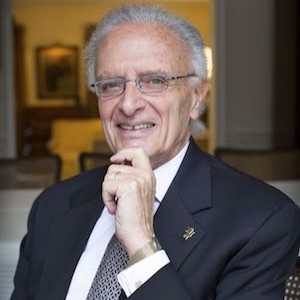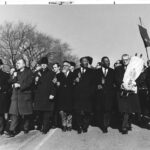Rabbi David R. Blumenthal, PhD
We, his readers, Jewish and Christian, stood in wonder before it – not before him, but before his ability to “walk with God.”

Jay and Leslie Cohen Professor of Judaic Studies
Emory University, retired
Atlanta, Georgia
A Jewish Perspective
I did not really know Abraham Joshua Heschel. I saw him at the Jewish Theological Seminary of America when I was as a student. I met with him in his office once or twice. And later, as a rabbi, I served with him on the national board of Clergy and Laity Concerned About Vietnam. It is primarily through his writings that Heschel became a major influence in my life.
My mother loved to tell the story that, at the age of four, I was in the synagogue where my father served as a rabbi. The rabbi and the cantor both wore clerical robes and tall hats as was the custom in those days. As the cantor was singing Kiddush, my mother reported, I turned to her and asked, “Is that God?” I think I have been asking that question all my life. I’m not good at negotiation, and I’m not good at institution building. But, I do know when God is present in my life, and I do know when He nudges me to act.
Abraham Joshua Heschel had this gift. He lived in the presence of God, and he acted according to what God moved him to do.
In one of his books, Heschel talks about how he wrote. He would put himself in the presence of God and only then would he write. It could be a paragraph, or a couple of pages, or only a line. And that was it. This is very hard to do. But it does yield words written on a background of consciousness of the divine presence in one’s life.
The Book of Psalms is written this way. Certain passages in the prophets are written this way, too. So are certain Hasidic writings. Maimonides, at the end of his Guide for the Perplexed, comments that one can achieve a state in which the presence of God is with one, always, allowing one to go about one’s daily business and still be aware of God: “I sleep but my heart waketh.” Heschel knew this, and worked and lived this way. We, his readers, Jewish and Christian, stood in wonder before it – not before him, but before his ability to “walk with God.”
In everything Heschel wrote whether about the Holocaust, or ethics, or philosophy, or old age, or the political situation, or prayer, or death, he always said the same thing: that one must live in the presence of God, that “our life must be compatible with the Ineffable.” This made Abraham Joshua Heschel a real theologian.
Heschel, through his writings and life, enabled me to give intellectual form to my four-year-old insight.
The first part of my Facing the Abusing God: A Theology of Protest (Westminster/John Knox: 1993) is an introduction to Jewish theology in Heschel’s sense of the word. The first chapter begins with the following passage:
To be a theologian is also to speak for God. It is to have a personal rapport with God, to have a sense of responsibility for God and for how God is understood and related to by our fellow human beings. It is to mediate between God, as one understands God, and those who listen. It is to create an echo of God in the other.
To be a theologian is to defend God, to put back together the pieces of broken awareness and shattered relationship. Great is the suffering of our fellow human beings, and deep is the estrangement between them and God. A theologian must be a healer of that relationship, a binder of wounds, one who comforts.
The second chapter goes on to talk about personality as the first “essential attribute” of God. God is personhood. That is why the Bible, the midrash, the prayerbook, the Zohar, and other sacred texts always talk about God in human terms. The third chapter talks about holiness as the second “essential attribute” of God. God is holy. That is why the word “holy” is so essential in all the sacred texts. You can’t talk about God without personhood and holiness. This is drawn straight from Heschel. (For selections, see here.)
Part Two of Facing the Abusing God goes on to deal with Psalms and contains four simultaneous commentaries on each psalm, each in a different voice. One voice explains the words. Another explores the classic Jewish values inherent in the texts. Yet another reads against the text. And the last offers spiritual interpretations of the text. Part Three, in a very Talmudic move, incorporates those voices that question the position taken in the book. And the conclusion to the book, which was difficult to write and is difficult to read, faces God directly, in His presence, and says what has to be said. Heschel died before the book was published. I think he would have agreed with my conclusion that protest to God was a proper response to living in God’s presence. He probably would have objected to my proposed changes to the liturgy. But, he would surely have thought that I was on the right path.
Heschel would also have appreciated other books on Jewish spirituality that I have written: God at the Center (Harper and Row: 1988) – a dialogue with the Hasidic Rabbi Levi Yitzhak of Berditchev; Keeping God at the Center (Hamilton Books, 2016 and on the internet here) – a book on ways to use the prayerbook to pray; Understanding Jewish Mysticism (two volumes, Ktav: 1978, 1982) – not a historical study but an explanation of different types of Jewish mystical experience; and Philosophic Mysticism: Essays in Rational Religion (Bar Ilan University: 2006 with selections here) — a type of mysticism taught by Maimonides who was both a philosopher and a mystic. It’s all about God, and the way humans experience God, as seen through Jewish texts. It’s “theocentrism” – all the way.
Once, in a meeting of the national board of Clergy and Laity Concerned About Vietnam, Daniel and Philip Berrigan, two well-known radical Catholic priests, were reporting on their activity which included burning draft cards and burning an American flag. Heschel, himself a refugee, turned as white as a sheet and said, “We don’t burn the American flag. It is a symbol of freedom and human dignity.” I have never forgotten that lesson. Some objects are holy, and we don’t burn them.
My wife and I were in Israel when the Hamas pogrom broke out. My son and I were about to go up to the Torah on Simhat Torah when the siren sounded. We spent the first ten days of the war with our family. At the end of the ten days, we realized that, at our age and in our condition, there was not much we could do. In fact, we were a burden to our family who had to keep track of us all the time. So, we left for the exile where we have been ever since.
Right at the beginning of the Hamas pogrom, I asked myself, what does God want me to do now. So, I began to write Letters, daily at the beginning and now, 250+ days into the war, every few days. At first, they were only read by a few friends but word spread and now about 160 people, Jews and non-Jews, receive them. Many reply. I became a shepherd of my people. That’s what God wanted me to do. This is exhausting work for all of us who serve as shepherds and, at my age, it is very exhausting. But I am sent. I am “called,” as our Christian friends would say. Heschel would have known that.
It is an honor to have lived in his shadow.
Additional Text
Books
Facing the Abusing God: A Theology of Protest (especially, section one)
Articles
“Tselem, Toward an Anthropopathic Theology of Image“
“Abraham Joshua Heschel: On The Inadequacy of the Ecumenical Perspective” (Journal of Ecumenical Studies, Spring 1992)
Book Review
